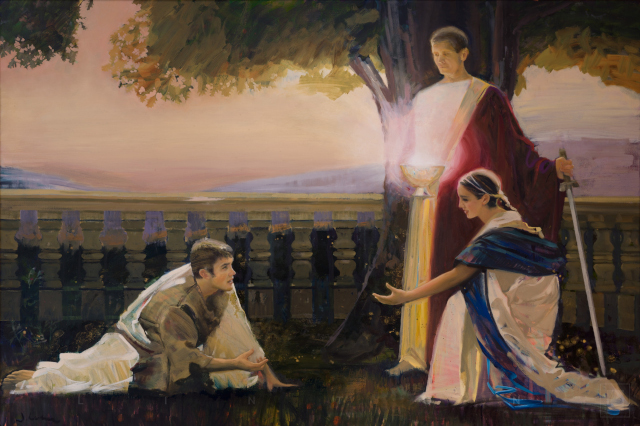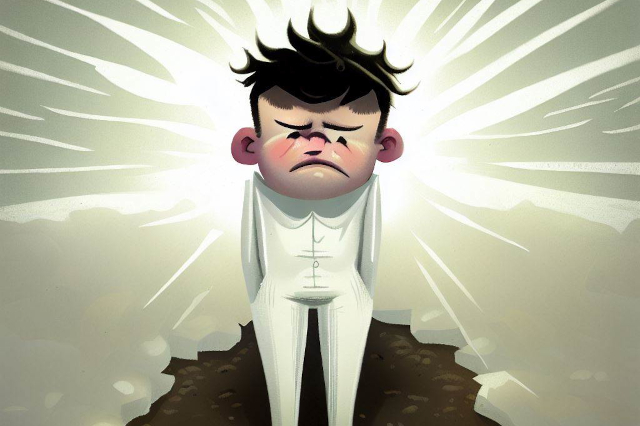
When repentance doesn't fix everything
Almost all my recent posts have dealt with the war chapters in Alma. The Nephites, led under Moroni, fought the Lamanites and learned lots of lessons along the way. So many years of terrible war, including 2 civil wars within the Nephites themselves. Eventually, Moroni and his armies won the day and the Nephites finally had peace. But sadly, the break was short; it was only a few years after Moroni passed away that the Nephites fell back into serious transgression and were ripe for destruction. Right on cue, like the itsy bitsy spider, down came the Lamanites to wipe the Nephites out.
The Nephites lose almost everything
In the past, the Lord had strengthened even the wicked Nephites in defending themselves against their enemies for the sake of the righteous who lived among them. But after the last war, there was a massive migration of many of the more righteous Nephites to the lands northward, so there were very few righteous among them worth saving, and the Lord accordingly withdrew His support.
City after city fell before the armies of the Lamanites. Moroni’s son, Moronihah, was unable to stem the tide, and within a short time, everything south of the narrow neck was under Lamanite control. Now teetering on the brink of destruction, the Nephites finally realized that maybe they ought to repent and get back in the Lord’s favor again. This led to some success:
When Moronihah saw that they did repent he did venture to lead them forth from place to place, and from city to city, even until they had regained the one-half of their property and the one-half of all their lands.
But that is where their success ended:
And it came to pass… that Moronihah could obtain no more possessions over the Lamanites.
Therefore they did abandon their design to obtain the remainder of their lands, for so numerous were the Lamanites that it became impossible for the Nephites to obtain more power over them; therefore Moronihah did employ all his armies in maintaining those parts which he had taken.
So why were the Nephites not able to get all their lands back? After all, they repented, right? They had paid their debts, they had learned their lesson. Why then didn’t God stretch forth His hand and restore all their blessings once they had repented?
The Atonement of Christ can save us from all sins…
This question has significant relevance to the Atonement of Christ. When we teach about the Atonement of Jesus Christ, we are keen to emphasize the incomprehensible breadth and scope of God’s willingness to forgive our sins. Like the example of the prodigal son: he wasted his portion of his father’s inheritance in “riotous living,” broke his covenants, estranged himself from his family, and lost everything. Humbled and broken, he returned to his father’s estate, hoping to eke out a meager living as a servant. But his father’s ability to forgive far exceeded anything that son could have hoped for. He was immediately reinstated and celebrated as the son of his father, decorated and honored with a robe, a ring, and a fatted calf. Like the prodigal in the parable, we teach that we will find far more mercy than we could ever hope for from our benevolent Heavenly Father.
This is an important principle. After all, one of Satan’s primary tactics is to whisper the sinister lie in our ear that although the reach of Christ’s Atonement extends to others and their transgressions, for whatever reason it cannot extend to us in ours. This evil lie discourages well-meaning men and women from turning to God, telling them that they are too lost, too far off the path to merit redemption. Our investigators and our members must understand that there is effectively no sin they are capable of committing that is beyond Christ’s reach of salvation. Ever.
… But the Atonement does not remove all consequences of all sins
On the other hand, I think that sometimes we are so eager to emphasize the completeness and the totality of God’s forgiveness that we may gloss over the fact that all sins— even repented sins— sometimes leave permanent scars. These lasting consequences influence our lives and the lives of those around us. Here are a few examples of this sobering truth that come to my mind:
The prodigal son
The prodigal son is our go-to example of the reach of God’s salvation; it also teaches the truth of lost opportunity. Yes, the repentant prodigal returned safe and sound to his father’s house and was accepted immediately as one of his beloved sons. But no amount of contrition could restore his lost inheritance. When his father passed away and everything he owned was bestowed upon the consistently faithful brother, the prodigal son would still be left with the burden of finding his way in the world and making his own living the rest of his life.
A brain-damaged child
President Monson shared a tragic story of a couple who had been fighting. While fighting, one threw something at the other, but hit their toddler instead, inflicting permanent brain damage. Happily, they started down the path of repentance, but they would still live with the consequences of their decision as they raised their now-disabled child (link).
”We are back alone”
Elder Andersen shared this touching account of an elderly couple:
Once I was asked to meet an older couple returning to the Church. They had been taught the gospel by their parents. After their marriage, they left the Church. Now, 50 years later, they were returning. I remember the husband coming into the office pulling an oxygen tank. They expressed regret at not having remained faithful. I told them of our happiness because of their return, assuring them of the Lord’s welcoming arms to those who repent. The elderly man responded, “We know this, Brother Andersen. But our sadness is that our children and grandchildren do not have the blessings of the gospel. We are back, but we are back alone.”
David
David, the noble king, chosen by God, committed two of the “big three” sins, adultery and murder. When confronted by the prophet, he confessed and sorely repented. But his repentance could not bring Uriah back to life. It could not restore Bath-sheba’s virtue, nor could not prevent the death of his infant son that resulted from it. It did, however, earn him the promise that eventually he will eventually receive forgiveness and salvation, but he is forever fallen from the promises of exaltation (link).
Convicted felons
Often, when a convicted felon finishes his sentence and is released from prison, there are restrictions imposed on his rights as a citizen, often including:
- The right to vote
- The right to travel abroad
- The right to bear arms
- Custody and/or parental rights
- etc
(source)
Coping with lasting consequences
Like I said, this is not to minimize the impact of God’s mercy and love in the slightest. These examples simply illustrate the fact that we sometimes overlook: that forgiveness does not mean that we are completely exempt from the consequences of our sins (even eternally sometimes as was David’s case). That may seem harsh, but we must remember that God does not do anything unless it is for our own benefit. For some reason we do yet understand, God sometimes allows some consequences of our mistakes to remain even after we are forgiven.
Returning to the example of the Nephites, I don’t know for sure why God did not immediately restore them to all their lands when they repented. But here are three suggestions:
Consequences help us see ourselves clearly
Those Nephites were forced to live every day away from their homes (now occupied by their enemies). This kept them in remembrance of the predicament they place themselves in when they sin:
And it came to pass, because of the greatness of the number of the Lamanites the Nephites were in great fear, lest they should be overpowered, and trodden down, and slain, and destroyed.
Yea, they began to remember the prophecies of Alma, and also the words of Mosiah; and they saw that they had been a stiffnecked people, and that they had set at naught the commandments of God…
They saw that their laws had become corrupted, and that they had become a wicked people…
They saw that they had become weak, like unto their brethren, the Lamanites, and that the Spirit of the Lord did no more preserve them…
They saw that the Lamanites were exceedingly more numerous than they, and except they should cleave unto the Lord their God they must unavoidably perish.
— Hel. 4
This predicament helped them see their reliance on God every day. If we let them, our consequences can also help us develop this clarified vision of ourselves too.
God sometimes builds faith through miraculous deliverance
Sometimes we are left in a negative situation we don’t like for a time so that God can show his power to us and those around us by delivering us out of it in a miraculous way. That’s what He did with Daniel and his friends, Peter and the Apostles, the people of Alma, and the three Nephite disciples. And it’s what He eventually did with the entire Nephite people after they lost their lands to the Lamanites.
A few years after their wars, the Prophet Nephi and his brother went on a mission to the Lamanites. They were so successful that the majority of the Lamanites were converted to the Gospel, permanently ending the centuries-long enmity between the two nations and prompting the Lamanites to voluntarily give the Nephites back all their lands without a drop of bloodshed. I hope the Nephites were grateful that God did not give them strength to continue fighting when He had a much better plan in play.
Consequences keep us repentant
The last step of repentance is forsaking the sin that we committed:
By this ye may know if a man repenteth of his sins— behold, he will confess them and forsake them.
In fact, when are guilty of repeat offenses, in a sense it undoes our previous repentance:
Unto that soul who sinneth shall the former sins return, saith the Lord your God.
— D&C 82:7
Unfortunately, in the case of the Nephites, almost immediately after God gave them back their lands, they fell again into wickedness, with almost all the people joining the robbers of Gadianton. Once the consequences were removed, it became evident that their repentance was not complete after all. This “pride cycle” has come to be the Nephites’ defining characteristic, and likely one of the main reasons God reserved the Book of Mormon for our day (“lest [we] become as the Nephites of old (D&C 38:39)”). Like the Nephites, when we mess up, God keeps just enough of the consequences in our lives to serve as reminders to help us understand what we have done and resist further temptation to do it again.
The miracle of the Atonement
That’s the real miracle of the Atonement. It’s not that we just become as clean or “good” as we were before we sinned—it’s that we come through the repentance experience better than we were before. Christ takes our bad situation (sin) and turns it into a learning experience that benefits us. True, we’re still learning our lessons “the hard way” (it’s much easier to maintain our spiritual cleanliness than to fix it), but it’s still learning nonetheless. And when all is said and done, when all the scores are settled and all the debts are paid, we will look back on our lives, satisfied and eternally grateful for the weight of our sins Christ bore. But we will also be grateful for the weight of those that Christ, in His mercy, let us continue to experience ourselves, to our benefit.


